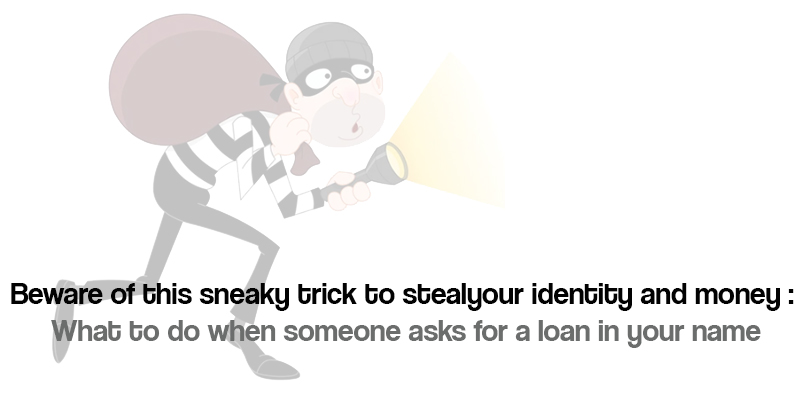Beware of this sneaky trick to steal your identity and money: What to do when someone asks for a loan in your name

Identity theft has become a common problem in today’s digitalized world. Scammers are getting even more advanced, and people are falling prey to their tactics. One such tactic is someone asking for a loan in your name. Scammers are using this sneaky trick to steal both your identity and money. In this article, we’ll discuss what to do if someone asks for a loan in your name and how to protect yourself from identity theft.
How does the scam work?
The scammer will reach out to you, pretending to be someone you know, like a friend or a relative. They’ll tell you that they’re in a financial crisis and need some money urgently. They’ll give you some excuse, like they’ve lost their wallet, their bank account has been frozen, or they need to pay an urgent bill. They’ll ask you to lend them money and promise to pay you back as soon as possible. Since they’re impersonating someone you know, you may be more likely to believe them and lend them money.
The scammer may ask you to transfer money to a bank account or use a money transfer service like Western Union or MoneyGram. Once you’ve sent the money, you’ll never hear from them again, and you won’t be able to recover it. The scammer may use the information they’ve collected to steal your identity or even take out a loan or a credit card in your name, leaving you with debt and a damaged credit score.
It’s essential to watch out for this scam and take necessary precautions to protect yourself.
How to protect yourself from the scam?
Here are some tips that can help you protect yourself from the loan scam:
- Be wary of unsolicited requests: Always be cautious when someone asks you for money. If someone you don’t know or trust asks you to lend them money, be skeptical and ask them questions to verify their identity.
- Verify the identity: If someone claims to be a friend or a relative, ask them personal questions that only they would know, like their birthday or their favorite color. You can also call them on their verified phone number or reach out to a mutual friend or a family member to verify their identity.
- Don’t transfer money: Never transfer money to someone without verifying their identity and the reason why they need the money. If you’re still unsure, suggest alternative ways to help them, like buying them groceries or paying their bills directly.
- Keep your information private: Be cautious about sharing your personal and financial information, like your Social Security number or bank account details, with anyone you don’t know or trust.
- Monitor your accounts regularly: Keep an eye on your bank and credit card accounts for any suspicious activities or unauthorized transactions. If you notice anything strange, report it immediately.
- Protect your identity: You can also take steps like freezing your credit, setting up fraud alerts, and using strong passwords to protect your identity from theft and fraud.
What to do if you’ve already fallen for the scam?
If you’ve already fallen for the scam and lent money to someone who turned out to be a scammer, here’s what you can do:
- Contact your bank: If you’ve transferred money to the scammer’s bank account, contact your bank immediately and try to reverse the transaction. If you’ve used a money transfer service, like Western Union or MoneyGram, contact their fraud department for assistance.
- File a police report: Report the incident to your local police station and provide them with all the details you have about the scammer and the transaction. Keep a copy of the police report for your records.
- Monitor your accounts: Keep a close eye on your bank and credit card accounts for any unauthorized transactions or new accounts opened in your name. If you notice anything suspicious, report it immediately to the concerned authorities.
- Protect your identity: You can also take steps to protect your identity from further theft and fraud, like freezing your credit and changing your passwords on all your accounts.
Conclusion
Scammers are always looking for new ways to steal your identity and money. Asking for a loan in your name is one such sneaky trick they’re using to con people. However, by being cautious, verifying the identity of the requester, and taking necessary precautions, you can protect yourself from falling for this scam. If you’ve already fallen for the scam, don’t panic. Contact your bank and the authorities immediately and take necessary steps to protect your identity from further fraud.







